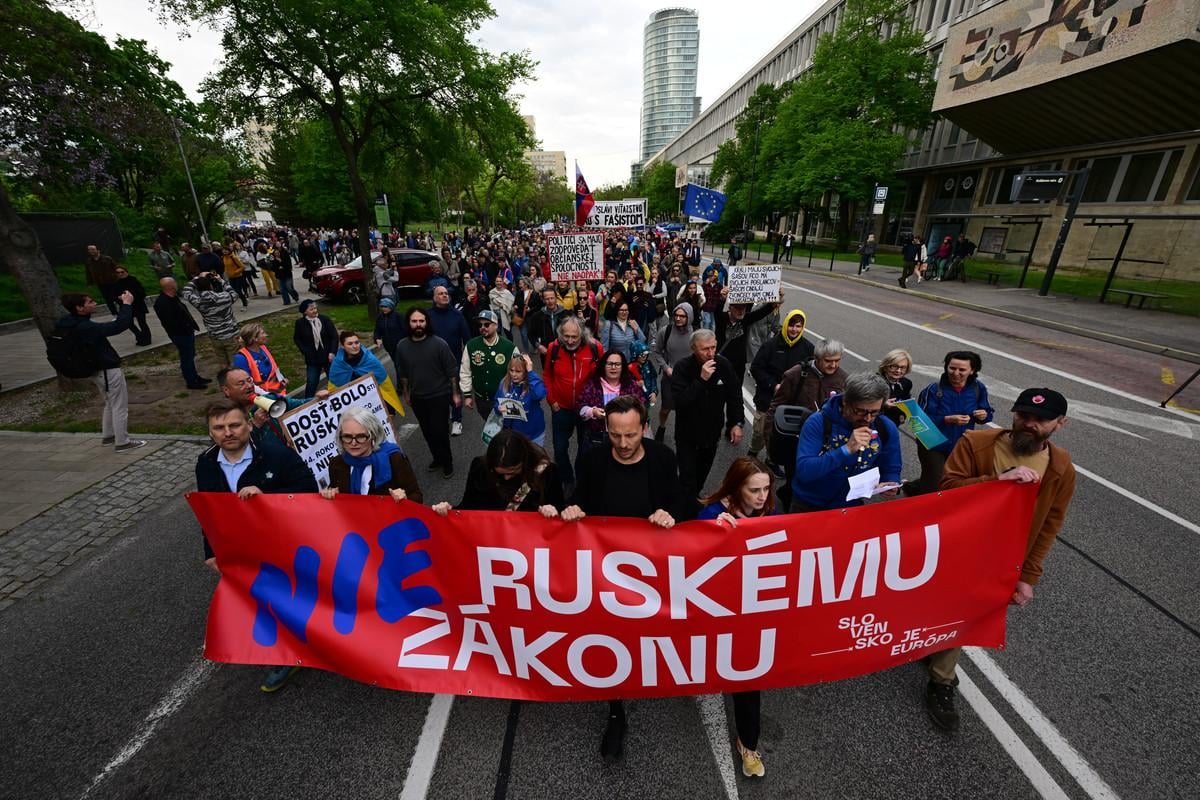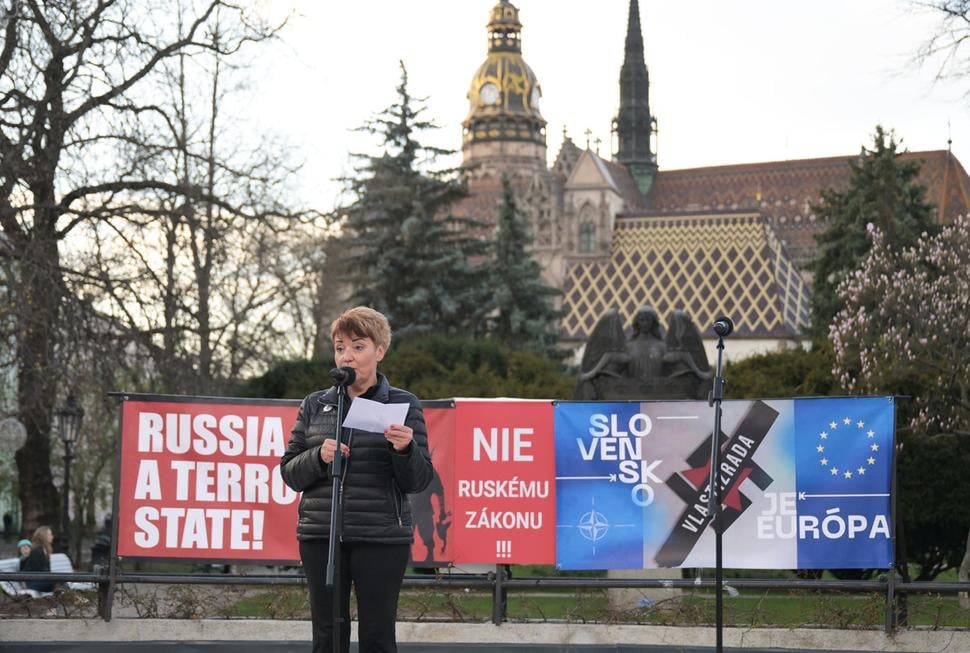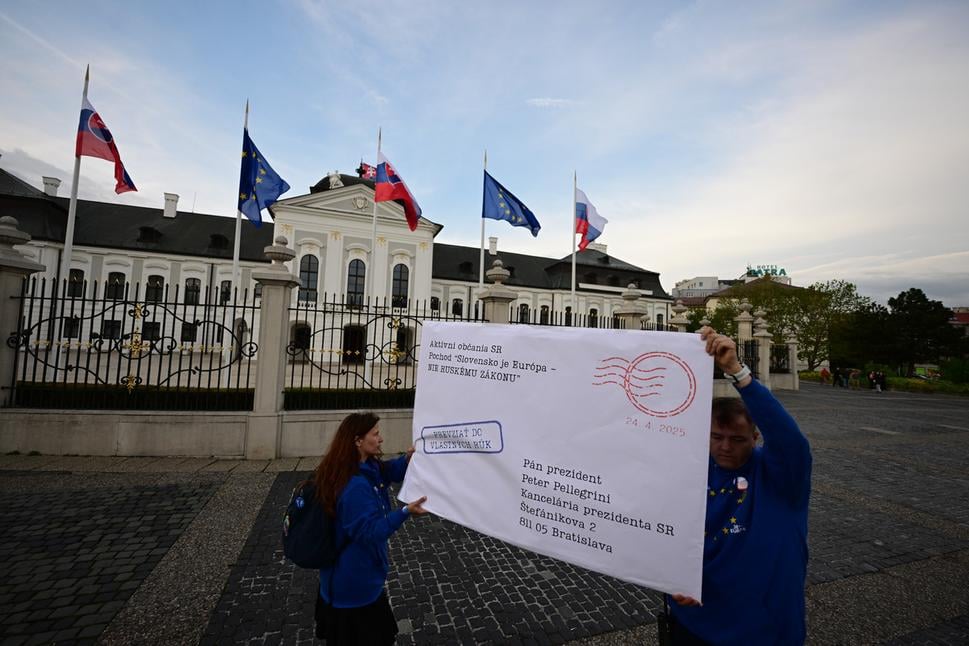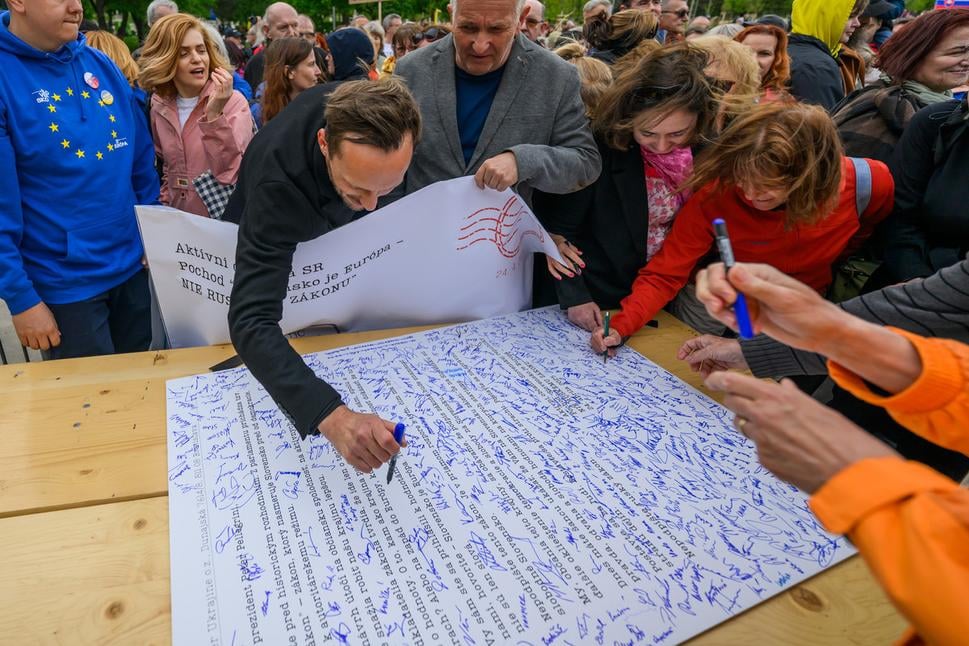For years, the League for Mental Health stood among Slovakia’s most trusted civil society organisations, supporting reforms, training specialists and stepping in where the state could not or would not. Its role extended beyond service delivery. The league became a voice for vulnerable communities, a partner in public health initiatives, and a crucial link between government policy and real-life practice. Now, its director says, it is being treated as an enemy of the state.
“In recent days, we’ve seen how state power can be abused. It was abused against us,” Andrej Vršanský, the league’s director, told the news website Aktuality in April. “We were cynically accused of fraud – of something we could not have done and did not do. It’s political bullying, and we’re just a rag being used to clean up someone else’s agenda.”
The allegation against the league came from Richard Glück, a lawmaker for the ruling Smer party, who cast doubt on whether it had actually held the number of events listed in its reports. What followed was not a routine audit or inquiry but a public assault by senior government officials, echoed in the press and followed swiftly by the passing of a contentious law many in the NGO sector are now calling a turning point for civil liberties in Slovakia.
On May 7, Slovakia’s president, Peter Pellegrini, signed the bill into law, thus imposing sweeping new disclosure rules on non-governmental organisations. Although it no longer includes the power to impose the inflammatory label “foreign agent” found in earlier drafts, the law still obliges NGOs to file transparency reports, reveal donor names, and submit to vague oversight powers held by the Interior Ministry. For many NGOs, the implications are not merely administrative but existential.
Critics say it is Slovakia’s own version of Russia’s foreign agent law, part of a broader effort by the ruling coalition to silence dissent and control public debate.
“This is about control, not transparency,” Vršanský warned. “The state is using legislation to intimidate organisations that work with the most vulnerable people. Smaller groups won’t survive this. They lack the legal teams and accounting departments to comply with Kafkaesque reporting demands.”
Mass anti-government protests continued in April. In Bratislava, an estimated 9,000 demonstrators marched through the capital on April 3 bearing banners reading “Slovakia is Europe” and “No to the Russian law”. The mood was defiant, the chants loud. Campaigners rallied again outside the Presidential Palace on April 24, after the bill passed parliament on April 16, pleading for a veto and delivering an oversized letter to Pellegrini.
The protests failed. Pellegrini’s office dismissed objections from legal experts, civil society groups and local government officials, saying the amended bill did not violate the constitution or EU law. Prime Minister Robert Fico, who campaigned on promises to “bring order” to NGOs, insisted the legislation was “European” in spirit.
“There’s nothing Russian about it,” he stated.
Yet for many in Slovakia’s civic sector, the battle over language was always beside the point. Even without the term “foreign agent”, they say the bill sends a chilling message: NGOs are suspect, their funding questionable, their motives untrustworthy.
Populist campaign
The roots of the law can be traced back to the 2023 parliamentary election, when Robert Fico, then in opposition, railed against what he called the “politically motivated” NGO sector. Civil society, he claimed, had become a proxy for foreign interests. “The era of NGOs ruling this country is over,” he declared in October 2023. “If they operate in Slovakia and are paid from abroad, they must be labelled foreign agents.” He promised to introduce an “American law” modelled on the US Foreign Agents Registration Act.
Legal experts quickly refuted that comparison. FARA applies narrowly to those lobbying on behalf of foreign governments. Slovakia’s proposal, especially in its early form, bore much closer resemblance to the Kremlin’s 2012 law, which has been used to muzzle dissent and label independent groups as threats to the state.
Even as the most extreme provisions were dropped in late 2024, including the foreign agent clause, the pressure on Slovak NGOs had already taken its toll. Statements by the ruling coalition created a climate of mistrust.
In 2023, President Zuzana Čaputová warned of growing hostility towards civic groups. “I regret that the rising animosity and aggression in society is now affecting the work of civil organisations,” she said. She described the verbal attacks and disinformation as symptoms of democratic backsliding.
At the time, over 70,000 NGOs operated in Slovakia, providing services ranging from education to health care to minority rights. Many now fear that increased scrutiny will force smaller outfits to shut down, narrowing the sector and silencing marginal voices.
In April 2024, the Interior Ministry abruptly dismissed five members of the Government Council for NGOs, a state-civic consultative body. The government said it was a routine rotation. Civil society leaders and opposition politicians called it political and noted that the move followed a wave of criticisms from dismissed members.
“This is another step in weakening the council and undermining civil society,” said the Carpathian Foundation’s Laura Dittel, one of the dismissed members.
From ally to enemy
Ironically, Fico once worked closely with NGOs. Under his previous administrations, funding for civil society increased, and several independent funds and programmes – including the Audiovisual Fund – were established.
During his third term as prime minister, between 2016 and 2018, his cabinet distributed millions of euros in grants to civil society organisations. Recipients included organisations frequently criticised by Fico, such as Transparency International Slovakia, the Open Society Foundation – founded by philanthropist George Soros, who is now a bogeyman for some Central European leaders including Fico – and MESA10, an economic think tank linked to former finance minister Ivan Mikloš.
In 2017, amid student-led anti-corruption protests, Fico even invited anti-corruption NGOs to a high-profile meeting. “If it’s the NGOs, then I trust it,” he said about anti-corruption and transparency projects at the time. It was an unexpected move from a politician known for his scepticism toward civil society.
Michal Piško, director of Transparency Slovakia, recalls a time when his organisation worked with Fico’s cabinets. That changed after the 2018 murder of journalist Ján Kuciak and his fiancée Martina Kušnírová. The ensuing mass protests, which Fico claimed were sponsored by groups linked to George Soros, ultimately forced him to resign as prime minister. “Only after stepping down did Fico name us among his chief enemies,” Piško told Aktuality.
“There was a Robert Fico before 2018, and then there’s the one after,” said Fedor Blaščák, a trustee at the Open Society Foundation. “He tied his comeback to a war on civil society.”
By 2023, Fico had fully reverted to his earlier rhetoric, branding NGOs as enemies.
From labelling to paperwork
The legislation’s path from proposal to law was turbulent and marked by repeated rewrites. When it was first introduced in early 2024 by MPs from the governing coalition, the draft bill required NGOs receiving more than €5,000 from foreign sources to label themselves as “organisations with foreign support” – a phrase many equated with Russia’s “foreign agent” law. That clause triggered an immediate outcry, drawing warnings from the Council of Europe and raising concerns in Brussels.
Facing pressure both domestically and internationally, lawmakers withdrew the foreign agent provision by late 2024. In its place came a revised proposal, spearheaded by Slovak National Party (SNS) MP Adam Lučanský. It no longer used the language of foreign support, but instead sought to define NGOs as “lobbyists” if they participated in public discourse or interacted with state officials. The plan included new reporting obligations and quarterly disclosures of meetings with policymakers.
This second version also met resistance. Critics argued it unfairly singled out NGOs, while corporate and professional lobbying groups remained untouched.
“The term ‘lobbyist’ was never intended for those entities,” said Juraj Gedra, head of the Government Office. “The biggest concentration of political lobbying is in select NGOs who’ve built their business model on it.” According to Gedra, such groups “influence public opinion, speak in the media, and shape public officials’ decisions”. Government advisors, including Smer MEP Erik Kaliňák, defended the legislation as fulfilling a long-standing promise to rein in what he and his Smer colleagues call “political NGOs” – naming watchdog groups like Via Iuris and the Let’s Stop Corruption Foundation.
“We are stripping them bare,” Gedra said, referring to new financial and operational disclosure rules.
Civil society leaders warned that even the scaled-back proposal threatened their ability to operate freely.
“This isn’t a lobbying law – it’s a punishment mechanism,” said Marcel Zajac, head of Slovakia’s NGO chamber, before the final version of the draft law was adopted. “When they realised ‘foreign agent’ was untenable in a civilised EU country, they repackaged it. Now we’re ‘lobbyists’.”
By the time parliament prepared for its final vote in April 2025, the ruling coalition had agreed to drop the “lobbyist” labelling as well, opting instead for a more technocratic approach: detailed financial disclosures and donor transparency requirements.
What resulted was a law focused on bureaucratic reporting rather than labels – but one that remains, opponents say, no less damaging to civil society.
Hard law, soft language
The final law, adopted on April 16, 2025, obliges NGOs with annual incomes over €35,000 to file detailed transparency reports. Those receiving at least €3,300 in one-off public aid or €10,000 in annual public funds will fall under the Freedom of Information Act. Organisations must name donors giving over €5,000 and list their governing bodies.
The penalties are stiff: fines range from €1,000 to €10,000 for non-compliance. Repeat violations could trigger further sanctions.
Transparency International Slovakia, a frequent target of Fico’s attacks, called the law “a weapon dressed up as reform”. Director Michal Piško said it targeted only watchdog groups, leaving business lobbyists untouched. Amnesty International called it a deliberate attempt to intimidate citizens and limit democratic participation.
The law’s final form was rushed through parliament; opposition MPs were still waiting to speak when the debate was cut short. A 20-page amendment landed just hours before the vote, drawing accusations of legislative chaos.
“Even a wild boar doesn’t know what we’re voting on,” said MP Branislav Vančo of opposition party Progressive Slovakia.
Opposition lawmakers lined up to condemn the bill as a politically motivated assault on civil society and call for it to be scrapped or returned for redrafting. Many warned it would face constitutional challenges and international condemnation. Za Ľudí leader Veronika Remišová said the law evoked totalitarian methods, likening its provisions to communist-era surveillance. “This government is waging war on those who give their time to help others,” she said.
Presidential silence
Following its adoption, President Pellegrini offered no public defence of the law before signing it on May 7. The coalition, which had aggressively championed it in public, fell largely silent. Implementation is due to begin in June 2025.
NGOs say they are still trying to make sense of the bill’s practical impact. Many fear it will entangle them in endless bureaucracy while failing to improve real oversight. They worry not only about how to comply with it, but also about being publicly targeted.
“We will now report less than we did before, since lobbying disclosures have been removed and transparency standards have declined – particularly affecting us as a foundation,” said Zuzana Petková of the Let’s Stop Corruption Foundation, which has been targeted by the government. “You will be targeting NGOs that don’t even have employees, just volunteers helping people in need, sick children, and lonely elderly people.”
Watchdog group Via Iuris warned of the law’s potential misuse by politically motivated citizens. Even groups receiving no public funds may face Kafkaesque information requests, driven by partisanship rather than genuine scrutiny.
War of words
During the parliamentary debate, government officials levelled fierce accusations at NGOs. Smer’s Richard Glück questioned the League for Mental Health’s reports and claimed it received €2 million to help Ukrainians without accounting for the money. Smer’s Juraj Gedra, head of the Government Office, accused NGOs of enjoying looser rules than political parties.
Smer MP Tibor Gašpar defended the bill as “in line with European standards”, claiming it was milder than regulations in the United States, Israel or even France. He cited a European Court of Auditors report that he claimed criticised NGO transparency. Glück warned of widespread misuse of charitable funds and likened Slovakia’s NGOs to a recent Czech case involving a convicted fraudster.
Dismissing critics who claim the bill draws inspiration from Russia, Glück argued that such comparisons ignore the European basis of the proposed legislation. “If this is a Russian law, then the European Commission and the European Court of Auditors must be Russian too,” he said sarcastically.
Opposition MP Zuzana Števulová accused the government of twisting European audit findings – which were critical of the EU, not NGOs – and ignoring the fact that NGOs, unlike political parties, do not wield power or manage public finances.
International backlash
Michael O’Flaherty, the Council of Europe’s human rights commissioner, warned the bill lacked safeguards and risked stigmatising NGOs. In 2024 and again in 2025, he urged lawmakers to reject it.
The European Commission echoed those concerns in its 2024 Rule of Law report, noting a narrowing of civil society space. It cited smear campaigns and funding cuts affecting organisations that support minority rights and counter disinformation.
The final law, even in diluted form, has left Slovakia’s civil society on edge. The opposition party Progressive Slovakia has challenged it before the Constitutional Court.
“This is about crushing civil society,” Vršanský said. “Just like in Russia, Georgia, Hungary. It’s about dividing people, frightening activists, hoarding power. We are the ones who stand in the way.”


 Protesters hold a banner reading “No to the Russian Law” during a “Slovakia Is Europe” rally held in Bratislava on Thursday, April 24, 2025. (source: TASR - Jaroslav Novák)
Protesters hold a banner reading “No to the Russian Law” during a “Slovakia Is Europe” rally held in Bratislava on Thursday, April 24, 2025. (source: TASR - Jaroslav Novák)
 A “No to the Russian Law!” march in Košice on April 3, 2025. Pictured: Laura Dittel, Director of the Carpathian Foundation and member of the executive board of the Platform for Democracy. (source: TASR - František Iván)
A “No to the Russian Law!” march in Košice on April 3, 2025. Pictured: Laura Dittel, Director of the Carpathian Foundation and member of the executive board of the Platform for Democracy. (source: TASR - František Iván)
 An open letter to Slovak President Peter Pellegrini, urging him not to sign the amendment to the NGO law, was delivered in front of the Presidential Palace during the “Slovakia Is Europe” protest in Bratislava on Thursday, April 24, 2025. (source: TASR - Jaroslav Novák)
An open letter to Slovak President Peter Pellegrini, urging him not to sign the amendment to the NGO law, was delivered in front of the Presidential Palace during the “Slovakia Is Europe” protest in Bratislava on Thursday, April 24, 2025. (source: TASR - Jaroslav Novák)
 Protesters sign the open letter to Slovak President Peter Pellegrini. (source: TASR - Jaroslav Novák)
Protesters sign the open letter to Slovak President Peter Pellegrini. (source: TASR - Jaroslav Novák)